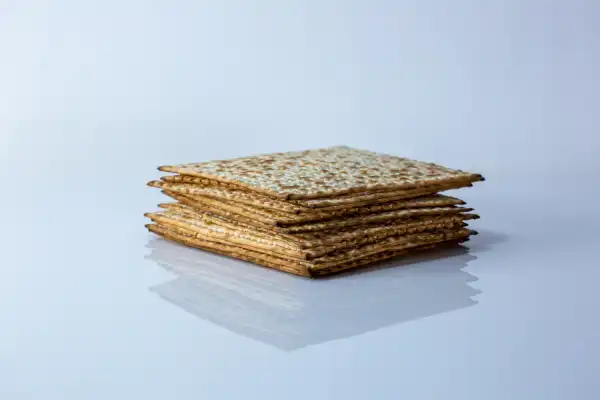Acceda a la base de datos First Foods® en Solid Starts App.
Leer másMatzah
Comida preparada
Sugerencia de edades
6 meses
Alto contenido de hierro
No
Alérgeno común
Sí

When can babies have matzah?
Matzah, as long as it has been modified to reduce the choking risk, may be introduced as soon as baby is ready to start solids, which is generally around 6 months of age. Matzah typically contains wheat and may contain other common allergens.
Matzah is an ancient food with origins in the lands around the Mediterranean Sea. A symbol of hope, humility, and freedom, the unleavened bread plays a key role on the Seder plate at Pesach, the Jewish holiday of Passover, although matzah is also enjoyed at secular meals and other religious holidays throughout the year. While homemade matzah can be soft, most commercially-produced matzah is crispy like a thin cracker. Matzah may be made with wheat, rye, or other grains and ingredients depending on one’s faith and use of the food, and it may be sold as whole crackers or meal—a key feature of knaidel (matzah balls).
How do you serve matzah to babies?
Cada bebé se desarrolla a su propio ritmo, y las sugerencias que ofrecemos sobre cómo cortar o preparar determinados alimentos son generalizaciones para una amplia audiencia.
6 months old +:
Offer matzah that has been soaked or softened in a baby-friendly liquid, such as water or applesauce, and serve in strips about the size of two adult fingers pressed together. Alternatively, share a large, soft matzah ball or offer thick strips of matzah brei about the size of two adult fingers pressed together. Matzah meal or finely ground matzah can also be used to add grip to slippery foods like avocado and mango. Avoid offering unmodified matzah at this age.
9 months old +:
Serve bite-sized pieces of matzah brei, matzah balls, or matzah crackers that have been thoroughly softened in a baby-friendly liquid such as water or applesauce. Avoid offering unmodified matzah at this age.
24 months old +:
When a child consistently shows mature eating skills (not overstuffing their mouth, chewing food thoroughly, spitting out food when it is posing a challenge or is not well chewed, etc.), they may be ready to try an unmodified piece of matzah. When practicing eating matzah, make sure the child is seated and supervised in a safe eating environment. Alternatively, serve dishes with softened matzah (like matzah brei) or dishes made with matzah meal.
Videos
Is matzah a choking hazard for babies?
Yes. Matzah and other cracker-like foods can be challenging for babies and toddlers, have sharp edges that can hurt the mouth and throat, and are often considered choking hazards. To reduce the risk, prepare and serve matzah in an age-appropriate way, as described in the How to Serve section. As always, make sure you create a safe eating environment and stay within an arm’s reach of baby during meals.
Learn the signs of choking and gagging and more about choking first aid in our free guides, Infant Rescue and Toddler Rescue.
Does matzah contain common allergens?
Yes. Matzah is commonly made with wheat or other glutenous grains such as barley and rye. Some varieties may contain eggs. Prior to sharing matzah with baby, it is important to introduce common food allergens on their own and rule them out as allergens before serving them together in a prepared food. This way, you’ll be able to identify which allergen is responsible if baby has a reaction. Then, when you are ready to offer matzah, you will be confident that they have already safely eaten any common food allergens in the dish.
As you would when introducing any new food, start by offering a small quantity for the first few servings. If there is no adverse reaction, gradually increase the quantity over future meals.
Is matzah healthy for babies?
Yes. In general, matzah is a great source of carbohydrates and offers a bit of protein. It can also offer varying amounts of fiber, folate, iron, and zinc. Together, these nutrients support baby’s energy needs, growth, digestive health, neurodevelopment, red blood cell formation, taste perception, and immunity.
¿Qué utensilios necesito para empezar?
¡Ninguno! Sirve los alimentos sólidos directamente en la bandeja, plato o tazón del/a bebé y luego deja que el/la bebé explore con las manos. Si lo deseas, tenga una cuchara o un tenedor disponibles para ayudarlo/a a familiarizarse con los utensilios, pero no se espera que adquiera las habilidades para usarlos hasta que sea un poco mayor.
¿Cuánta comida debo servirle al/a bebé?
Al comienzo, ofrece una pequeña cantidad y confía en que tu bebé sabe cómo mostrar interés si quiere más haciendo ruidos, gestos, o gritando o extendiendo la mano. Ten en cuenta que la mayoría de los bebés entre 6 y 9 meses de edad no consumen muchos alimentos sólidos al principio. Para los bebés de entre 10 y 12 meses de edad, enfócate en ofrecer el equivalente a una comida equilibrada para adultos, pero con porciones más pequeñas. Pon atención a las señales que te da el/la niño/a: cuando el/la bebé te muestre que desea “más”, ofrécele más comida. Cuando el/la bebé muestre señales de “ya terminé”, para de ofrecerle comida.
Nuestro equipo
Escrito por
Consejos de expertos directo a tu bandeja de entrada
¡Suscríbete y recibe correos semanales con recetas, consejos y más!
Copyright © 2026 • Solid Starts Inc






